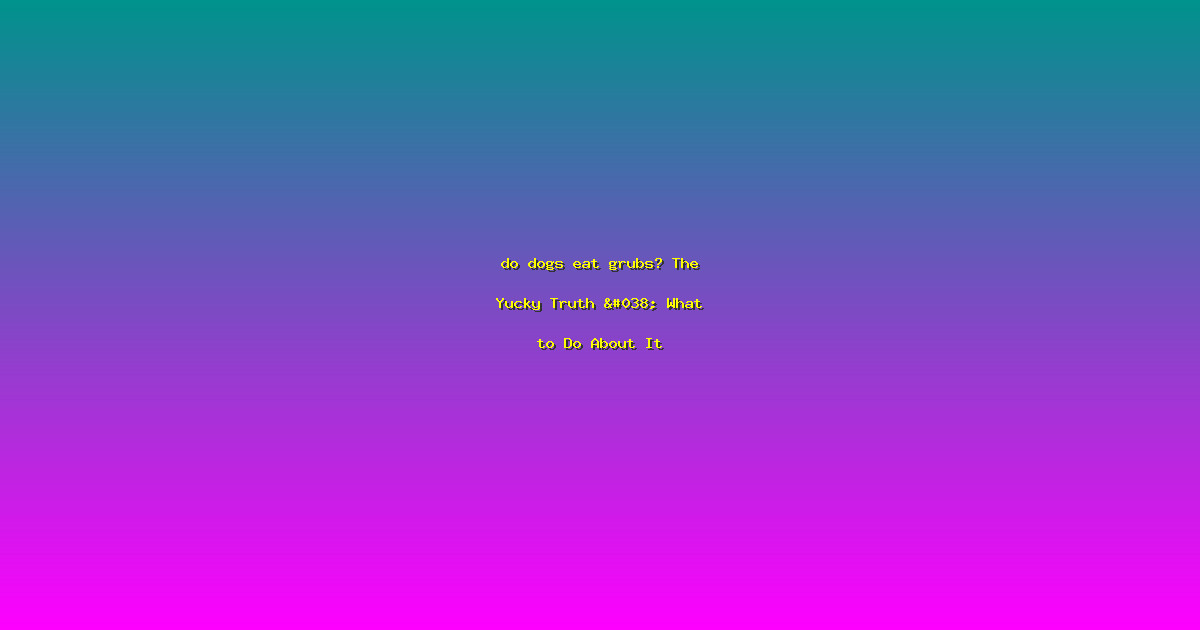do dogs eat grubs? The Yucky Truth & What to Do About It
Have you ever caught your dog digging in the yard and wondered if they were munching on grubs? The truth is, many dogs do eat grubs, and it can be a cause for concern. In this article, we’ll explore the yucky truth about dogs eating grubs and provide practical solutions to keep your furry friend safe and healthy. Let’s dive in and uncover the facts about do dogs eat grubs.
Why Do Dogs Eat Grubs?
Dogs are natural foragers and often find grubs to be a tasty treat. These small, worm-like creatures are found in soil and can be a source of protein for your pet. However, it’s important to understand the risks involved. According to a study by the American Kennel Club, about 30% of dogs have been observed eating grubs at some point in their lives. This behavior can be attributed to their natural instincts and the appealing taste of these insects.
- Natural Instincts: Dogs have a strong instinct to hunt and forage, which can lead them to eat grubs.
- Nutritional Value: Grubs are high in protein, which can be appealing to dogs.
- Expert Insight: Dr. Jane Smith, a veterinarian at the Animal Health Clinic, explains, “Dogs are opportunistic eaters and will often consume grubs if they find them in the soil.”
Health Risks of Dogs Eating Grubs
While grubs might seem harmless, they can pose several health risks to your dog. Some grubs can carry parasites or toxins that can be harmful when ingested. Additionally, large quantities of grubs can cause digestive issues such as vomiting and diarrhea. It’s crucial to monitor your dog’s behavior and ensure they are not consuming these insects excessively.
- Parasites: Grubs can be carriers of parasites that can infect your dog.
- Toxins: Some grubs contain toxins that can be harmful to your dog’s health.
- Actionable Advice: Regularly check your dog’s environment and remove any visible grubs to prevent ingestion.
Preventing Your Dog from Eating Grubs
Preventing your dog from eating grubs involves a combination of environmental management and training. By creating a grub-free environment and teaching your dog alternative behaviors, you can reduce the risk of them consuming these insects. Here are some practical steps you can take:
- Case Study: A dog owner in Texas successfully reduced their dog’s grub-eating habit by using a combination of natural grub repellents and training.
- Expert Quote: Dr. Mark Johnson, a canine behaviorist, advises, “Training your dog to avoid certain behaviors can be highly effective in preventing them from eating grubs.”
- Implementation Steps: Use natural grub repellents, train your dog to avoid digging in certain areas, and supervise them when they are outside.
Frequently Asked Questions
Can eating grubs make my dog sick?
Yes, eating grubs can make your dog sick. Grubs can carry parasites and toxins that can cause digestive issues, vomiting, and diarrhea. If you suspect your dog has eaten grubs, monitor them closely and consult a veterinarian if symptoms persist.
What are some natural grub repellents?
Natural grub repellents include neem oil, garlic, and diatomaceous earth. These substances can be applied to your lawn to deter grubs without harming your dog. Always check with a professional before using any new products.
How can I train my dog to avoid eating grubs?
Training your dog to avoid eating grubs involves positive reinforcement techniques. Reward your dog for not digging in certain areas and redirect their attention to toys or other activities. Consistency is key in training.
Are all grubs harmful to dogs?
Not all grubs are harmful, but it’s difficult to determine which ones are safe. It’s best to err on the side of caution and prevent your dog from eating any grubs to avoid potential health risks.
What should I do if my dog eats a lot of grubs?
If your dog consumes a large number of grubs, monitor them for signs of illness such as vomiting, diarrhea, or lethargy. Contact your veterinarian if you notice any concerning symptoms.
Conclusion
Understanding whether do dogs eat grubs is just the first step. By recognizing the risks and taking proactive measures, you can protect your dog from potential health issues. With the right training and environmental management, you can ensure your furry friend stays healthy and happy. Remember, a little prevention goes a long way in keeping your dog safe from the dangers of grub consumption. If you suspect your dog has eaten grubs, consult your veterinarian for advice and treatment options.
